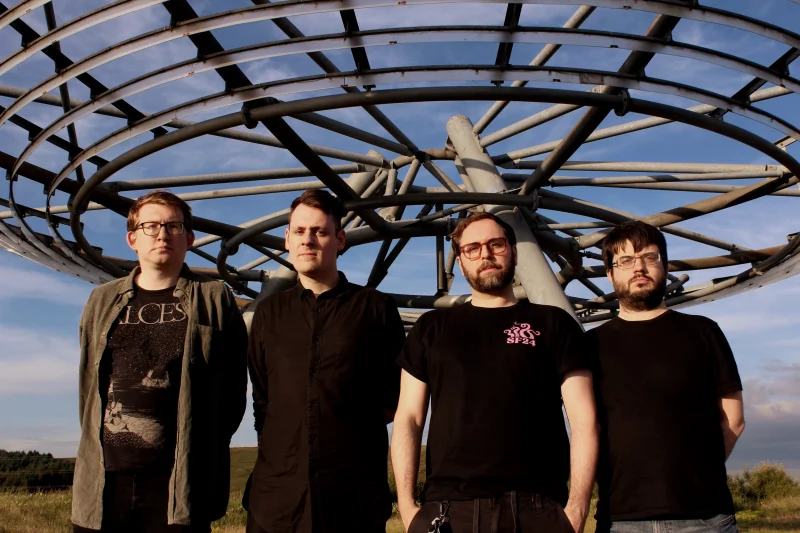On their debut album, ‘/// LIGHT’, UK post-rock upstarts Civil Service show plenty of ambition. From the outset of ‘Retreat’s 14-minute long soundscape, to ‘Yawning‘s stirring and haunting final moments, the Manchester-based quartet provide a captivating post-rock record. Aided by Dave Sanderson’s sonically impressive production work, Dystopian Future Movies‘ Caroline Cawley’s serving as the album’s narrator, and its over-arching sci-fi themes, there is a lot to take in on ‘/// LIGHT’. However, Civil Service has produced an immersive, multi-faceted record, filled with astronomical highs and ponderous lows.
For example, ‘Lines of Communication’ thrives with urgency with voice samples, radio signals and Morse code buried underneath Fran Atkinson’s and Alex Coates’ swirling guitars and James Wilkes’ rumbling bass. ‘Apology’ flourishes as Civil Service momentarily jam out as they weave in neon synth textures. Whereas the aforementioned ‘Yawning’ is a two-song, 20-minute journey in itself. At times, it’s restrained, gradually building using luscious atmospheric guitars alongside pulsating bass lines. Thom Hamper’s electronic drums, along with Cawley’s sound bites, lend it an icy build that eventually spirals away. Its second half capitalises on the vacant atmosphere. As Wilkes provides a delicious bass groove amongst twinkling guitars, a remote choir of UK post-rock peers (Din Of Celestial Birds, Dutch Elm, L.O.E and more), sees Civil Service‘s rocket ascend with energetic drums and distant distortion.
Having built a stunning world through ‘///LIGHT’s post-rock odyssey, it’s safe to say Civil Service are fans of the genre. However, as we come to learn, their influences aren’t entirely based off of some of the genre’s most prominent names. To give us an insight into how their sound came to be, the members of Civil Service picked out eight inspirational albums.
Hope of the State – The Lost Riots
Alex (Coates – Guitar and programming): In 2004, Hope of the States was signed by some Sony exec desperately seeking the next Radiohead. Instead, they delivered ‘The Lost Riots’. The album immediately knocks you off-guard with ‘The Black Amnesias’, a sprawling and visceral nearly 5-minute instrumental cold-open, featuring soaring trumpet and heart-rending violin sections which tear you from your expectations and force you to feel. The record closes with the secret track ‘A Crack Up At The Race Riots’, which, beyond a brief vocal lament, is another largely experimental instrumental piece.
Whilst the pages of the album in between these songs are flawless, these two tracks in particular set me on a journey in life to seek out and celebrate post-rock. Through the band, I’d be versed in the classics like GY!BE, Mogwai, Sigur Ros, 65DOS & A Silver Mount Zion. I would come to appreciate that, whilst a catchy sing-along is great, humanity used music as an evolutionary tool to convey emotional resonance. 20 years later, nothing has done that more for me than HOTS’ ‘The Lost Riots’.
65daysofstatic – We Were Exploding Anyway
Alex: No band unites Civil Service more than 65daysofstatic. Each of us could, and will, argue for any of their records to feature here, but I’m backing an underdog in ‘WWEA’. 65DOS, right from the outset, was a band that grabbed me for never resting on ‘their sound’. In instrumental music, especially post-rock, there is perhaps a tendency to take two routes as you progress – stick to the tried and tested and produce near indistinguishable albums, or vary the theme by “going heavier” or “stripped back”. Instead, 65DOS made their quintessential album, whilst seismically restructuring the songs towards an electronic focus.
The piano playing is unmistakably Paul (Wolinsk); the drums are unmistakably Rob (Jones); the balance and texture of guitars alongside a variety of other instruments imitating guitar noise are hallmarks of the band. But it’s completely different – akin to the shift Editors made on ‘In This Light and On This Evening’. In both cases, whilst the respective bands’ ‘bigger’, more ‘crowd-pleasing’ songs may lie elsewhere, the statement these albums make surpasses the sum of their parts.
Maybeshewill – I Was Here for a Moment, Then I Was Gone
Fran (Atkinson – Guitar, synths and programming): This is one of my favourite post-rock albums of all time. I got into it around 10 years ago when I was growing more disillusioned with the indie revolution of the 2000s and looking for more immersive music. I had some post-rock experience, but it was on finding Maybeshewill that I decided to make it my entire personality. Post-rock, as beautiful a genre as it is, can often be a hard listen unless you’re in a very contemplative mood. Maybeshewill were throwing hooks, rock-outs, and danceable rhythms into four-minute songs, and it made for a very addictive and forbidden-feeling package.
We’ve not quite cut our songs down to 4 minutes, but they remind me to throw new ideas in and give the audience some chances to move about in between the chin-stroking. Their willingness to put keys and piano upfront, when the songs required, influenced me a lot to try and put down the guitar from time to time, though I am far less accomplished a pianist. The record is lushly produced and is perfectly sequenced as a record you have to play in its entirety, without ever overstaying its welcome. I love this record, and it’s one of the few post-rock records I’m always in the mood to listen to.
The Jezabels – Synthia
Fran: This is the part in which I shoehorn in some connections between this record and the sound of Civil Service, so I can bang on about The Jezabels and their third album ‘Synthia’, which is the best album of the 2010s and the greatest indie record of all time.
This record is an absolute journey of feminist fury and torment, set amongst a syrupy synth-rock backdrop. There are expansive soundscapes of keys and guitar, which intermingle so tantalizingly close to being shoegaze without the self-indulgence. The bookends of the album are more epic and life-affirming than any crescendo we could hope to muster, but I’ll keep on trying. We’re also unlikely to ever write a song so perfectly eviscerating the male gaze as ‘Smile’, but the drive to capture the explosion of sound that welcomes the chorus has influenced me on a multitude of songs I’ve written for the band.
It may not be post-rock, but this is a band that takes the listener on a journey, yet allows them the freedom to stray from the path and explore what lies at the periphery of their majestic vision. We can only hope to offer a similar experience on ‘/// LIGHT’.
Secret Machines – Now Here Is Nowhere
Thom (Hamper – Drums, percussion, programming and fuzz mandolin): This was the first album I remember buying where I felt something different to anything I’d heard before. The songs were long and repetitive, sounds were layered one on top of another, the bass work was a thump of organ, and the drums sounded like gunshots. It was the first time I’d noticed just how much work had gone into the arrangement of the songs, and how that can affect an album’s feel and message. The meandering piano and vocal melodies of ‘Pharaoh’s Daughter’ have always been a favourite.
BadBadNotGood – IV
Thom: I’ve selected this album, as for me, it inspired more maturity in my approach to music. The album hops around from intense jazz to lulling ballads, but none of it feels out of place as all the songs have the same bones and the same DNA. It’s inspired me to branch out in my playing and how I approach timbre and texture in a song – and how important it is for music to feel cohesive.
Joy Division – Closer
James (Wilkes – Bass): Joy Division are almost certainly the most influential band on my bass playing. I could have easily chosen ‘Unknown Pleasures’ instead, but there’s a slightly wider range of playing styles here that have given me ideas over the years. I must have first heard this when I was 16 and I’d honestly never heard anything like it before. Oppressive and claustrophobic, I’ve heard few albums that come close to the perfect sound here and the bass is just fantastic throughout.
The highlight is ‘Twenty Four Hours’, drenched in chorus and strumming two strings throughout, it’s one of my favourite bass lines ever (and I use chorus on my bass at every opportunity now!).
Mogwai – Happy Songs for Happy People
James: ‘The Lost Riots’ was the first album I owned with a distinct post-rock influence on it, but this was my first ‘pure’ post-rock album in that it was my first, almost purely, instrumental album. Whilst it’s not as loud as Mogwai’s other albums, it has all the hallmarks. Slow, repetitive builds and epic crescendos feature throughout, all whilst remaining gorgeous and melodic throughout. The break from this is the sheer noise of ‘Ratts Of The Capital’, which showcases the sheer noise Mogwai can conjure. The bass sounds absolutely massive here as well, and I always want my bass to sound big when we hit our loud sections.
‘///LIGHT’ by Civil Service is available now on Ripcord Records.
Civil Service will host the Akari Festival at 33 Oldham Street, Manchester on Saturday, 30th November 2024. Halifax post-rock quartet LoE (Last of Eden) will headline. The line-up includes Mountainscape, New Ghost, and Maebe. Civil Service will be performing ///LIGHT’ in full.
Find Civil Service on: Facebook | X (Formerly Twitter) | Instagram | TikTok | Spotify | Apple Music | Bandcamp | Linktr.ee | Website

